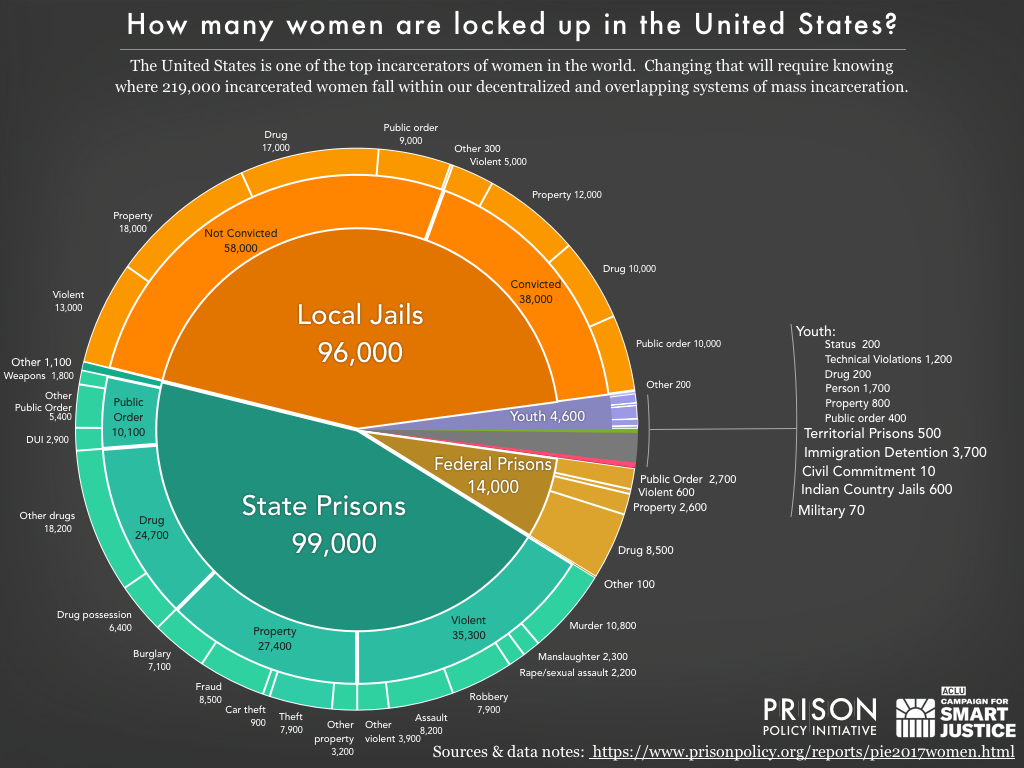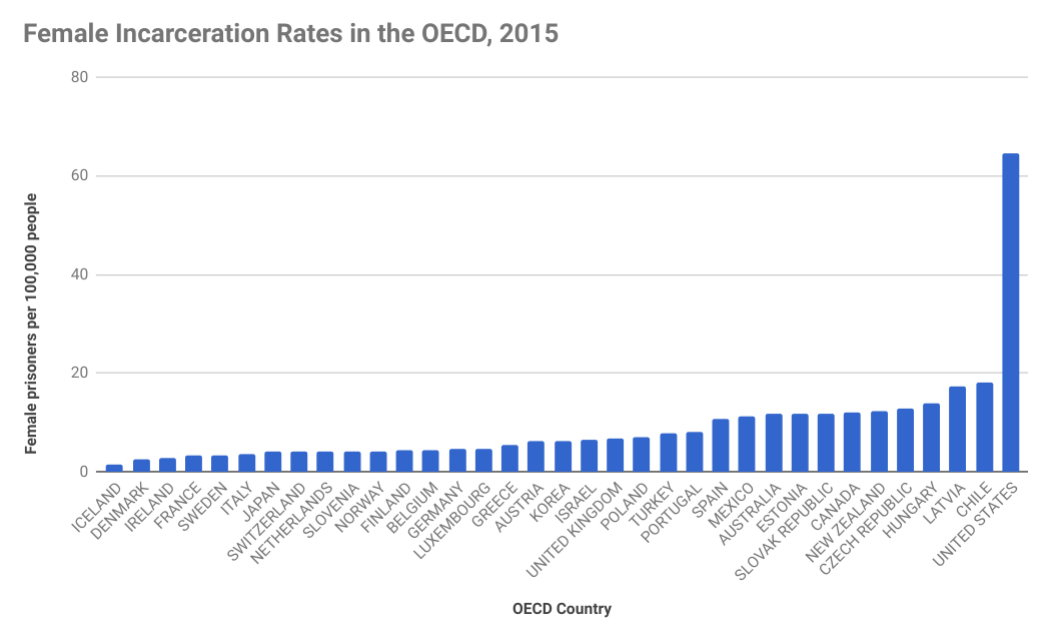How American women are left to rot in jail
Over a quarter of women prisoners have not been convicted. That's a grotesque injustice.


When it comes to mass incarceration, men get most of the attention — and for obvious reasons. Men commit roughly 80 percent of violent crimes, and they make up over 90 percent of prisoners.
However, by industrialized country standards, America's imprisonment of women is arguably even worse than it is for men — and as a new analysis from Aleks Kajstura at the Prison Policy Initiative shows, a great many of those women do not need to be behind bars.
Kajstura did a lot of painstaking work to create a full picture of the state of women's incarceration in America. As usual with such studies, the underlying data is from several sources, and some of it is somewhat scanty or old — but America simply doesn't have rigorous, up-to-date information on all people under criminal supervision. Until data collection is overhauled, this is the best that can be done:
The Week
Escape your echo chamber. Get the facts behind the news, plus analysis from multiple perspectives.

Sign up for The Week's Free Newsletters
From our morning news briefing to a weekly Good News Newsletter, get the best of The Week delivered directly to your inbox.
From our morning news briefing to a weekly Good News Newsletter, get the best of The Week delivered directly to your inbox.

(Courtesy Prison Policy Initiative)
Where this differs from the overall picture of Americans behind bars is in the much larger share of female prisoners in jails. Whereas the total prison population is roughly two-thirds in state prisons, women prisoners are about equally split between jails and prisons. (The Prison Policy Initiative has not yet done a male-only breakdown, but given that women are less than 10 percent of the total prison population, removing them from the overall chart would not change the result very much.)
This matters because, as I have written before, a large majority of people in jails have not been convicted of a crime — they are either stuck in pre-trial detention, or simply can't afford bail. Fully 60 percent of women in jails have not been convicted of a crime — and due to the greater jail share of the total female incarcerated population, over a quarter of women behind bars have not been convicted.
Without better data, it's impossible to say for sure why non-convicts are stuck in jail. But as Kajstura argues, lack of money almost certainly accounts for the bulk of the explanation:
A free daily email with the biggest news stories of the day – and the best features from TheWeek.com
The number of unconvicted women stuck in jail is surely not because courts are considering women, who are generally the primary caregivers of children, to be a flight risk. The far more likely answer is that incarcerated women, who have lower incomes than incarcerated men, have an even harder time affording cash bail. A previous study found that women who could not make bail had an annual median income of just $11,071. And among those women, black women had a median annual income of only $9,083 (just 20 percent that of a white non-incarcerated man). When the typical $10,000 bail amounts to a full year’s income, it’s no wonder that women are stuck in jail awaiting trial. [Prison Policy Initiative]
So how does this compare to other developed countries? The Organization for Economic Cooperation and Development is a rough proxy, so here's a chart I made by pulling international figures from a 2015 Prison Studies compilation of data. (Again, much of this data is somewhat out of date, but it gives a decent rough picture.) Here is the female incarceration rate per 100,000 people, by OECD members:

The discrepancy here is even larger than it is for overall prison numbers. Among OECD countries, the second-place rate for total incarceration (Israel) is 40 percent that of the U.S. But the second-place rate for female incarceration (Chile) is only 28 percent of the U.S. figure. Similarly, the overall U.S. rate is almost six times the overall OECD median rate — but for women only, the U.S. rate is over 10 times the median rate. For individual states, the picture is even worse. West Virginia incarcerates so many of its women that if it were a country, its female incarceration rate alone would put it in second place overall in the OECD.
If we wish to reduce the grotesque toll of misery and death inflicted by the prison system, the easiest place to start is by getting non-convicts out of jails. The most obvious step is to drastically cut back the use of money bail — especially for poor defendants. Tens of thousands of women (and men) are stuck rotting in jail — where many of them end up committing suicide, the single leading cause of death in jails — because they can't afford to pay their bail. It is morally outrageous and an egregious violation of constitutional rights. It must be stopped.
Ryan Cooper is a national correspondent at TheWeek.com. His work has appeared in the Washington Monthly, The New Republic, and the Washington Post.
-
 ‘Let 2026 be a year of reckoning’
‘Let 2026 be a year of reckoning’Instant Opinion Opinion, comment and editorials of the day
-
 Why is Iran facing its biggest protests in years?
Why is Iran facing its biggest protests in years?TODAY’S BIG QUESTION Iranians are taking to the streets as a growing movement of civic unrest threatens a fragile stability
-
 How prediction markets have spread to politics
How prediction markets have spread to politicsThe explainer Everything’s a gamble
